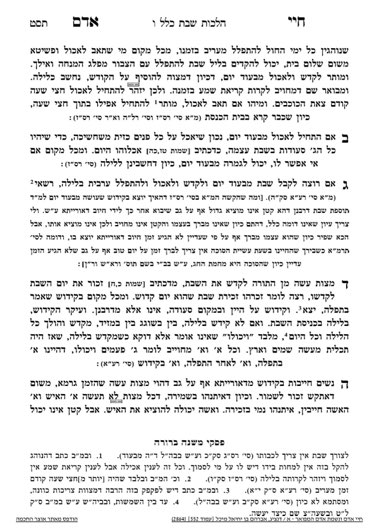The current series, which will cover Maariv on Friday night and Kiddush, is available for sponsorship. Please contact Rabbi Reingold for more information.
We are beginning siman 4. We learned that the ikar chiyuv kiddush can be fulfilled through shemoneh esrei, and that miderabanan one has to make kiddush on wine, and it should be b’makom seudah.
The Chayei Adam writes that the most appropriate time to recite kiddush is at the beginning of Shabbos. The Rambam points out that it is appropriate from the moment Shabbos starts. If a person has a special guest, they do not wait a few days into the visit to point out the uniqueness of the guest. Thus, it is most appropriate to recite kiddush as soon as (feasibly) possible. However, if it did not happen, and one did not make kiddush at the beginning of Friday Night, they can recite it later, including the next day. For example, if one was not feeling well on Friday night, the next day they would recite the nusach of the kiddush we say on Friday night, rather than the nusach of kiddusha rabba (Shabbos day).
Parenthetically, the term kiddusha rabba is a euphemistic language. It is not as choshuv as the kiddush on Friday Night, for which Chazal instituted a special bracha, but essentially it is borei pri hagafen. Therefore, in order to avoid referring to kiddush on Shabbos day in a pejorative way, we call it kiddusha rabba. However, the main kiddush is on Friday Night, and has elements of both deoraysa and derabanans.
The Chayei Adam continues, and writes that even when one is making kiddush for the first time of Shabbos day (as opposed to the night), they do not recite the paragraph of vayechulu. He explains that vayechulu talks about the moment creation was completed, and is uniquely appropriate for Friday Night, when that moment happened historically.
Thus, in a certain sense, it comes out that vayechulu and kiddush are somewhat separate.
The Chayei Adam continues, and writes that every person must say vayechulu three times. Therefore, we recite it during shemoneh esrei, after shemoneh esrei, and again at home when making kiddush. This idea comes from the Rokeach, who holds that one must recite vayechulu three times for kabbalistic reasons. The Tur writes that the reason for reciting vayechulu a third time is simply because of people who were not in shul, such as wives and children, and were not yet yotzei. The Tur’s understanding is completely different from that of the Rokeach.
Even if one holds like the Rokeach, for the third time, they are yotzei through the kiddush of their host,. One should keep in mind that the medakeish is being motzi them in vayechulu. The medakeish should have in mind that he is helping those listening to fulfill their obligation.
Summary
- The most appropriate time to recite kiddush is once Shabbos has begun. However, if one does not end up making kiddush until the next day, they would recite the Friday Night kiddush but without vayechulu.
- A person should try to recite vayechulu three times.


